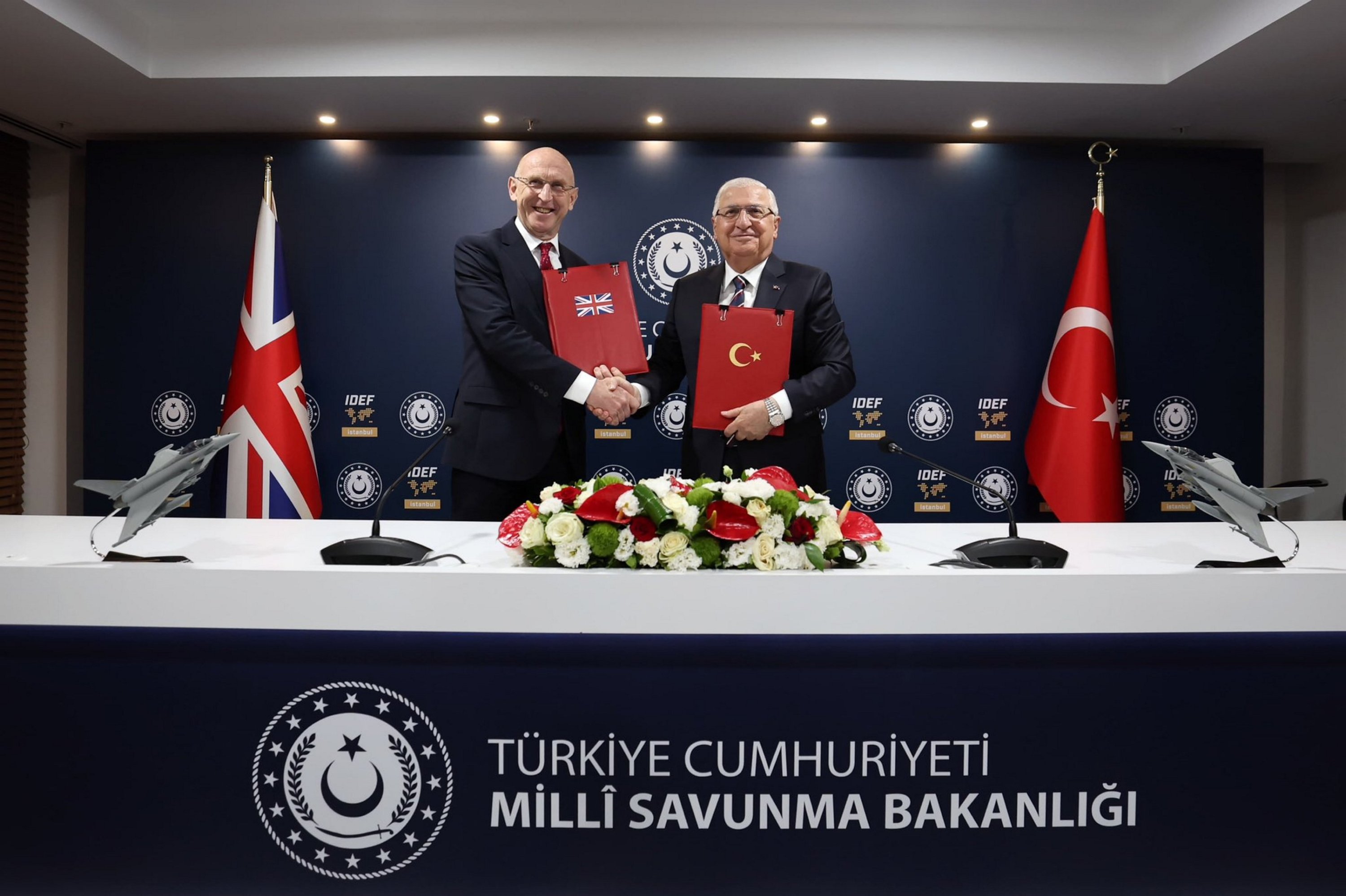Physical Address
Indirizzo: Via Mario Greco 60, Buttigliera Alta, 10090, Torino, Italy
Physical Address
Indirizzo: Via Mario Greco 60, Buttigliera Alta, 10090, Torino, Italy

Türkiye reached deals with NATO allies Britain and Germany on Wednesday that pave the way to acquiring dozens of Eurofighter Typhoon fighter jets, which Ankara has sought to modernize its air fleet and strengthen defenses amid growing regional instability.
Britain signed a preliminary deal allowing Ankara to operate the jets while Germany approved delivery of 40 of them to Türkiye, which has relied on both foreign purchases and its own defense industry projects, including domestic jets, to ramp up deterrence.
Turkish Defense Minister Yaşar Güler and his British counterpart, John Healey, inked a memorandum of understanding during the International Defense Industry Fair (IDEF) 2025 in Istanbul, the Ministry of National Defense said.
Beyond the Eurofighters, Ankara is also in talks with Washington to purchase 40 F-16s.
Israel’s attacks on regional countries, including its 12-day conflict with Türkiye’s neighbor Iran and more recent strikes on another neighbor, Syria, have unnerved Ankara, prompting a push for rapid armament in order to counter any potential threats.
Türkiye has been in talks since 2023 to purchase 40 Eurofighter Typhoons, which are built by a consortium of Germany, Britain, Italy and Spain, represented by Airbus, BAE Systems and Leonardo.
Germany reportedly initially opposed the sale but later reversed its position. Britain led negotiations on behalf of the consortium.
Speaking at a signing ceremony in Istanbul, Güler said the deal brought Türkiye “one step closer to a fully comprehensive agreement” on the jets, adding it would also strengthen NATO and Türkiye’s aerial capabilities.
“We welcome this positive step toward our country joining the Eurofighter Typhoon club, and want to reiterate our mutual ambition to complete the necessary arrangements as soon as possible,” he said.
Güler also told reporters that the composition of the planned acquisition was for 40 jets but that different options were being considered.
Turkish officials have said that they are still negotiating over pricing and technical terms, saying that they have received an initial offer and expect to submit a counterproposal.
The agreement comes a day after President Recep Tayyip Erdoğan’s call with British Prime Minister Keir Starmer, in which they reviewed progress on Türkiye’s potential procurement of the jets.
The two sides expressed optimism that developments in this area would further strengthen defense cooperation between Ankara and London.

Wednesday’s agreement “is a big step” toward Türkiye buying the jets, said Britain’s Healey.
“Equipping Türkiye with Typhoons would strengthen NATO’s collective defence, and boost both our countries’ industrial bases by securing thousands of skilled jobs across the UK for years to come,” the minister noted.
In a separate statement, the U.K. Ministry of Defense said both ministers underscored the importance of the two countries’ “longstanding defence cooperation,” including collaboration through NATO and growing ties in the defense industry and security.
“Both Ministers committed to deepening this strategic partnership in support of the Alliance’s collective deterrence,” it added.
The statement noted that the two nations continue to make “excellent progress” on the export of Eurofighters, describing it as “the start of a new chapter” in the U.K.-Türkiye partnership.
“Welcoming Türkiye as a Typhoon operator would build on the bonds of friendship developed over many decades between key NATO Allies and would be a significant step towards enhancing Türkiye’s advanced combat air capabilities,” read the statement.
Separately, the German government has cleared the way for the delivery, after initially opposing the sale, a government spokesperson said on Wednesday.
Earlier on Wednesday, Spiegel news magazine reported that the government’s Federal Security Council, which decides on arms export licences based on legal and foreign policy considerations, had made a positive decision on the order for 40 jets.
“I can only confirm that the Ministry of Defense has sent a written confirmation to the Turkish government confirming that the export has been approved,” government spokesperson Stefan Kornelius said when asked about the report at a regular press conference in Berlin.
The agreements come after weeks of positive statements from Ankara and the Eurofighter consortium on the sale, with Erdoğan praising the German and British stance on the issue this week.
Britain said negotiations with Türkiye over an ultimate sale will continue over the coming weeks.
The deal would be the first export order secured by Britain for the jet since 2017 and would give a new lease of life to the final assembly line at BAE’s factory in northern England.
U.K.’s Starmer said the multi-billion dollar agreement with Türkiye would “sustain and protect 20,000 U.K. jobs for future years to come,” while an official at BAE Systems said last week the company was confident of winning new orders from countries, including Türkiye.
The deal underscores the importance of long-standing defense cooperation between Türkiye and the U.K. through NATO and the critical role Typhoon plays in security and defense in Europe and the Middle East, said Charles Woodburn, chief executive of BAE Systems.
Türkiye, despite boasting NATO’s second-largest army, has often in the past faced arms embargoes. That pushed it to significantly boost domestic capabilities and curb foreign dependence over the last two decades.
Today, it produces a wide range of vehicles and arms types domestically, including its own drones, missiles and naval vessels. It’s also developing its own fifth-generation fighter jet, named Kaan.
Kaan is sought to replace the Air Forces Command’s aging F-16 fleet, which is planned to be phased out starting in the 2030s. Its mass production is expected to start in 2028.
Türkiye is also seeking to return to the U.S.-led F-35 fighter jet program, from which the country was removed in 2019, following its purchase of Russian-made S-400 missile defense systems.